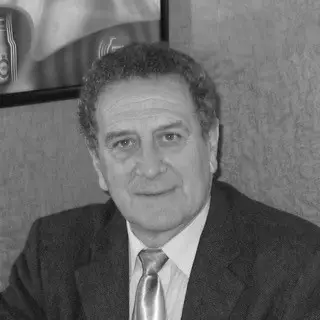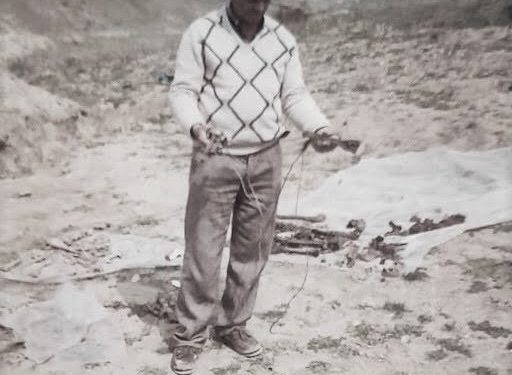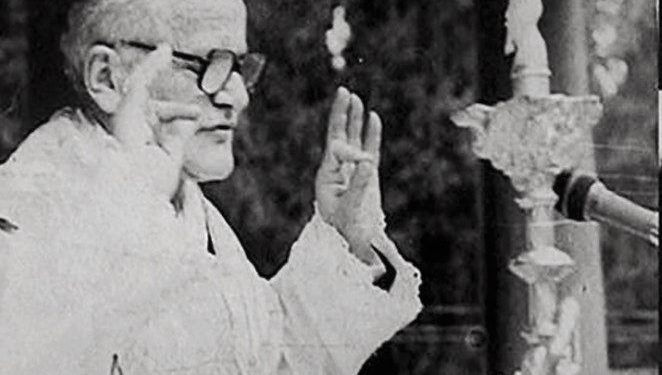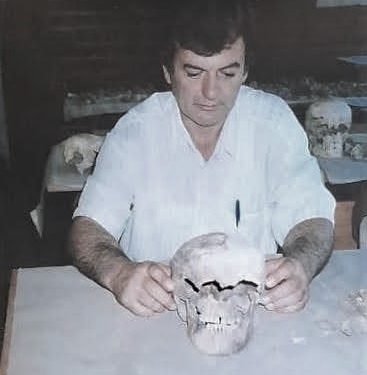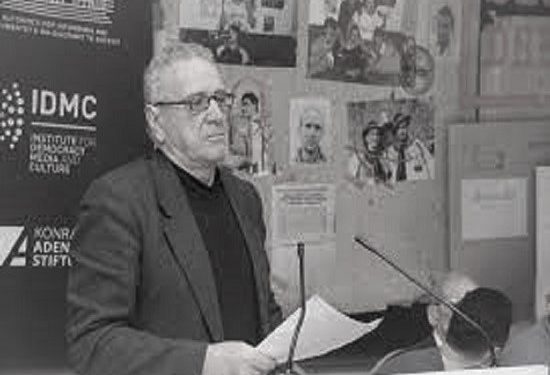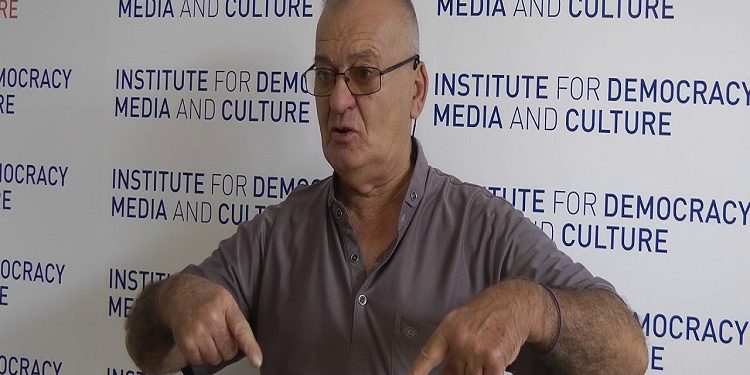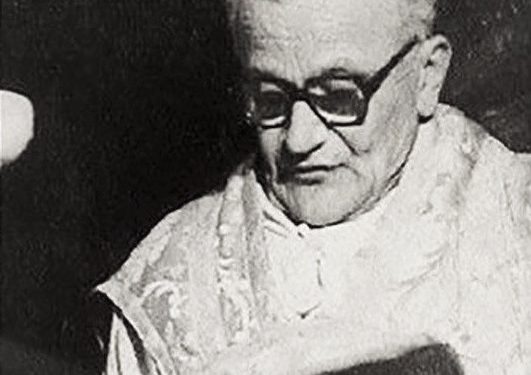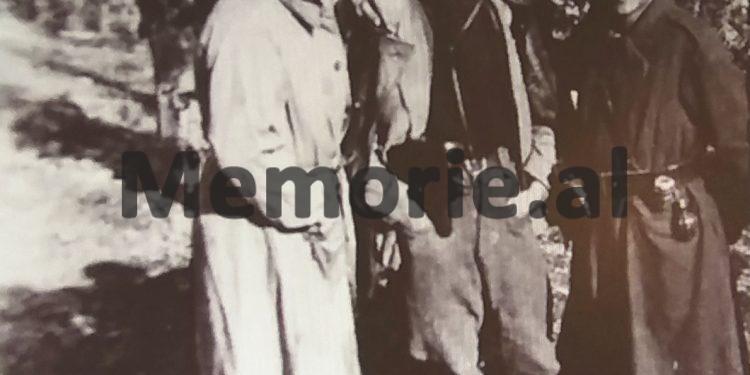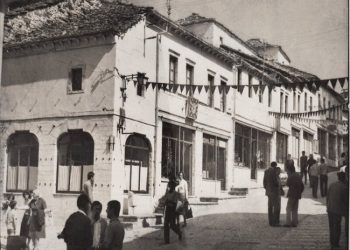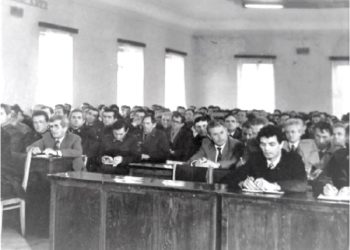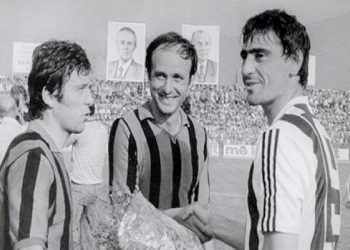By Filip Guraziu
The twelfth part
Continues from last issue
Memorie.al / I recall, with great emotion, the first anti-communist rally, which was organized a few weeks later, in the square in front of the Isa Buletini monument, in Shkodër, by representatives of the Democratic Party. Good luck Shkodra, he was at that rally. From the occasional tribune (a storefront, one story high), the leaders of the PD, newly formed, dressed in white overcoats, gave fiery speeches against the communist crime, which left us “breathless”. . The political situation was changing 360 degrees.
Unforgettable, for the emotions we experienced, remains my participation with my wife, and with many friends and friends (the family of Beniamin Deda), in the mass of Kërshendella, on December 24, 1990, at the Chapel of the Rrmaji Orphans.
Shkodra the best was in that place; Dom Simon got the word out! In addition to faith in God, this manifestation also demonstrated mass citizen opposition against communist violence.
In the family, with relatives, friends and colleagues, they talked about nothing but the possibility of overthrowing the dictatorial system, the signs was clear. The Democratic Party was also founded in Shkodër, there was talk of the first pluralist elections, which were scheduled for March 31, 1991.
The political cauldron was boiling, as if according to an invisible scenario, directed by Ramiz Ali, that was intended to realize (without violence) the respect of the system and the temporary “surrender” of power (just for the sake of it)! Although, for many reasons and facing the facts, we had our doubts (I remember the televised pre-election speech of the chairman of the Republican Party, Sabri Godo, March 1991), at that time, because of the hatred for communism, we did not “have time”, I thought and with reasoning, how honest the democracy was being projected in Albania.
We valued as vital the acquisition of priority rights, which we had been missing for half a century; such as freedom of speech, the right to believe, the right to political pluralism, the right to move freely from Albania, as well as the “promise”, which was declared, for the right to return property. Under these conditions, we, the persecuted families, sincerely joined the “opposition” (P.D) against the Communist Party in power.
In February 1991, a hunger strike of the students of the State University of Tirana began, with economic and political demands, the persistence of the strikers and the “scenario” of Ramiz Ali concluded in favor of the demands of the students, who were excited by the “victory”. , flooded the center of Tirana, and together with the people, taking advantage of the “passivity” of the police forces, on February 20, 1991, they threw down the magnificent monument of the dictator, Enver Hoxha, dragged him through the streets of Tirana and subdued him, urinated in public.
Apparently the peaceful revolution had won; the former communists opened the way. No one was punished for what happened! In the first, pluralist elections, on March 31, 1991, the district of Shkodra voted almost entirely for the Democratic Party. Otherwise, it happened in the rest of Albania, especially in the south, where the communists won. The first pluralist parliament, which emerged after the elections, had a socialist majority.
Shkodra did not accept this situation and protested violently on April 2, 1991, in front of the Party Committee. The situation got out of control of the police forces, which used their weapons and killed 4 demonstrators and injured 84 others. Popular hatred burned the building of the Party Committee, Shkodër District, and also tried to burn the Library and the Radio, but luckily, thanks to the immediate intervention of some elements with “authority” and vision, the crowd retreated… !
The indignation of the crime in Shkodër spread throughout the country, the trade unions announced a national strike, which paralyzed the economy and after three months, which happened under popular pressure, but also before severe economic difficulties (there was a lack of bread for the people, the payment of 80% of monthly salary, do not go to work, etc.), the President, Ramiz Alia, announced the formation of the Government of Stability, with the Socialist Prime Minister, Ylli Bufi, and the participation of all parliamentary parties (June 11 to December 6, 1991), by was replaced by the technical government of the socialist Vilson Ahmeti, which took over the preparation of the new parliamentary elections on March 22, 1992.
Since, in Shkodër, in the first pluralist elections, on March 31, 1991, the democrats won convincingly, during the period of the technical stability government, the city and the district remained in the hands of the representatives of the Democratic Party.
The reform, which deserves to be remembered, is related to the immediate return of the stores seized by the communist regime, during the dictatorship period, to the real owner, as well as the appointment of representatives of the anti-communist opposition to important positions at the local level. In September 1991, I had the honor to be appointed director of the “Jordan Misja” High School, Shkodër.
The blood that calls is not forgotten!
It was the summer of 1943, when the nationalist forces and the communist forces began to think about the programming of their union, in the struggle for national liberation against the Italian occupier. On August 1-3, 1943, in Mukje, near Tirana, a meeting was organized that took the name “Mukje Conference”, where representatives of the nationalist and communist forces participated, with the aim of cooperation in the war.
The joint decision, which was signed by both parties, was rejected, categorically, by Enver Hoxha, by order of the Yugoslav communists, who did not accept the popular referendum on the future of Kosovo. This moment is known in history as the beginning of the “civil war”, during the Second World War, in Albania.
In that meeting, as listeners without the right to vote, two patriotic soldiers, from Kosovo, graduated from European military academies, also participated: Mr. Ismail Shehu and Mr. Krasniqi. According to the information of family members, it turns out that the above military men had expressed, during the Mukje meeting, in favor of the union of Kosovo with Albania. That was enough for Albania’s enemies and traitors to sentence them to death.
On October 8, 1943, they were returning to Gjakovë, with their car, when suddenly, on the road to Kukës, in Rrapaj (Puka District), a pick-up truck stopped in front of them – they took their way – from which two sat down themselves, who were checking the car’s fault…! Mr. Shehu and Mr. Krasniqi got out of the car, they gave him help, but the moment they approached him, the two men took out their automatic weapons and shot them!
Time passed and no one gave reliable information about what happened to these two patriotic men, everything remained a mystery as if in a fog. However, their families understood that the murder was an act ordered by the Yugoslav communists and carried out by the Albanians (according to the family members, the assassin was Vasil Shanto). This is how the elimination of all those patriots who opposed the continuation of Kosovo under Serbia had begun.
Years passed, other Albanian nationalists were eliminated on both sides of the political border. The communist terror had come out of legality, now the murders and eliminations were done by popular trials, predetermined by the “Party”. On February 26, 1951, without a judicial process, but only by a terrorist decision of the Political Bureau, headed by Enver Hoxha and Mehmet Shehu, 22 innocent intellectuals (today, Honor of the Nation) were shot, including Tefik Shehu, a graduate in economics and jurisprudence in Italy, Ismaili’s brother (we killed him in the assassination above the market)
The son of the late Tefik Shehu, Hyseni, did not arrive to know his father, because on 26.02.1951, when the communists shot his father, he was in his mother’s womb…! He grew up in exile, as a member of the declassified class, since he was the son of the “enemy”…! He served the army in the “work wards”. During his military service, he befriended a soldier, who lived in Rrapaj village, Pukë, with the surname Çera.
And, as it usually happens, in the free hours, the conversation stopped, and among other things, the soldier Avni Çera told them (in a low voice, as a secret) about an event that was about to happen, during the War of World War II, in his family, where by chance his father, Mr. Çera, originally from Peshkopie, but moved to Rrapaj for family reasons, had been a witness.
Livadhi, in front of the house of Mr. Çera, bordered by the automobile road, from Shkodra, going towards Kukës, and at some point of the day Mr. Chera felt the bursts of machine gun fire coming from the side of the road. He immediately took the direction of the highway and was left wide-eyed in horror: two men lying on the ground, bleeding and dying. It was a barbell! There was an ambush that maybe someone would come to take and arrange the dead, but hours passed, and no one came alive.
His manliness and humanity forced him to commit an action, not only difficult, but also with possible consequences…! With the help of family members, he carried the corpses to his backyard. He found out their identity from the documents and, since time was running out, he buried them in the backyard, together with a bottle, where the identity of the corpse was written.
They were turbulent, difficult and dangerous times, times of war…! Intuitively, Mr. Çeraj was close to the truth; the killing could be political! There was no reason to report the incident, because there could be accusations and other unpleasant problems. Years passed, the communist dictatorship came, and complete silence was preferred. Only he and his family knew the secret of the event!
Hysen Shehu could not believe his ears, he immediately connected the event: perhaps one of the corpses was his uncle, Ismaili, who disappeared without a trace, while the second one was returning home via the road to Kukës, on October 8 of 1943? He couldn’t wait for the military service to end, to reveal the truth.
The time came and Hyseni did not delay, but went for a “visit” to his friend’s family, in Rrapaj, Pukë, where he found traditional Albanian hospitality and had the opportunity, through direct conversation, with the owner of the house, Mr. Slit. He reconfirmed the above event, as well as the place where the two corpses were buried.
They opened the pit together, where the uncle, Ismail Shehu, was buried and, in complete secrecy, Hyseni collected the bones of the corpse, put them in a tin box used by painters, isolated it as much as he could on our sides, thanked Mr. Çera and his family gave him their word that, not only would he not discuss the incident with third parties, but also with his family members; nana, sister.
He gave his word and kept his word. To the Çera family, you don’t have any “thorn in your side”, in relation to the above.
It was the year 1974, when Hyseni, dressed in his work clothes (to avoid any possible checks on the way), returned home, together with the “paint box”, put in his backpack. He placed the “paint box” on the balcony of the apartment. To the women of the house, he said: don’t touch it, because a friend had left it for safekeeping!
The next day, he went to the cemetery in Tirana, met “Rrupi”, the undertaker with “skin tanned by the sun”, to whom he asked for help in burying the remains of a family member, who long ago had been buried in his backyard. Rrupi had told him in a low voice that this work is not done, because for every burial, documents etc. are required. The “paint box”, made of tin, remained on the balcony of the apartment untouched, for 17 years!
Only in 1991, when the communist dictatorial system collapsed and the political prisoners were released from prison, Hysen Shehu arrived to bury, for the second time, the late Ismail Shehu, in a dignified grave, next to the grave of Ismail’s mother, Hysen’s grandmother, Nasida.
But, the son of the Shehler family of Gjakova, Hyseni did not find peace; he had buried his grandmother, but his father, Tefiku, was left without a grave. In addition to the tasks of life and family, his mind did not rest in search of the “red hole”, where the communist crime was covered.
In continuous efforts, thanks to the words that were circulating, he reached the peasant family in Mënik (near the Ndroqi bridge), where the old man of the house told the horror of that night, in which 22 people were shot and thrown into a pit. The witness villager had shown approximately where the “red pit” was located.
With Hysen’s intervention, a bulldozer opened the pit and fortunately for me and the other 21 families, the remains of the victims were discovered: a gold wedding ring, confirmed the identity of one of them; it was the wedding ring of the deceased Zydi Herri, which gave complete certainty that the victims of the communist massacre of February 26, 1951 were there.
In 1993, with an official ceremony, organized by the Municipality of Tirana, the remains of the 22 victims were reburied, in a monumental grave, positioned in a special place in the “Martyrs of the Nation” cemetery, in Tirana. Personally, I am eternally grateful to my friend, my brother in misfortune, Mr. Hysen Shehu, for his work, in honor of our parents, unforgettable. Memorie.al
Note: The data, for the above article, were obtained from the protagonist of the event, Mr. Hysen Shehu.
The next issue follows




